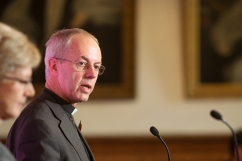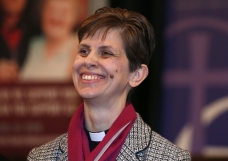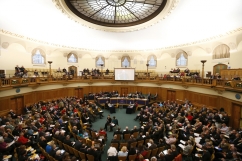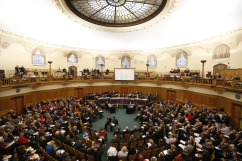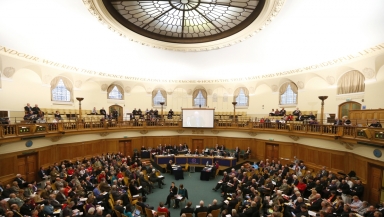
England's established Church must adopt one of its most radical shake-ups in generations if it is not to go into "terrifying" decline, senior Church leaders warn today.
In a raft of proposals backed by the Archbishops of Canterbury and York and published today, a series of reforms are put forward that are designed to halt the long-term decline that has decimated congregations around the nation in the last 60 years. In addition, the aim is to increase numbers of those training for the priesthood by 50 per cent from 2020.
The papers will hit the new General Synod members due to be elected in the autumn for the next quinquennium with an unprecedented workload that could surpass even the stress of the last 10 years, when discussions were dominated by repeated conflicts over women bishops.
The workload will be especially stringent given that one of the proposed reforms is to reduce the maximum number of synod meetings from nine to six days a year in a bid to cut costs.
It leaves the Church little time to sit back and enjoy the success of the legislation as the consecration of the first woman bishop at York Minster approaches in the next few weeks. However, it is also hoped that the removal of the stained-glass ceiling could encourage more women to come forward for ministry and thus boost numbers.
The Archbishop of Canterbury Justin Welby says in one of the papers to the synod: "The urgency of the challenge facing us is not in doubt. Attendance at Church of England services has declined at an average of 1 per cent per annum over recent decades." In addition, congregations were on average older than the general population. At the same time, four in ten of the clergy are due to retire in the next decade.
One of the plans is to develop "discipleship", which will include a revision of the Church of England catechism, described in the papers by the Bishop of Sheffield Steven Croft as an "important but neglected document".
The Church has more than £6bn in capital funds which goes back to Anglo-Saxon times and narrowly escaped being seized by Henry VII when he stole land from the monasteries.
In 2013 the Commissioners spent just under £208 million, of which £121.5 million went on pensions. Of the rest, 47 per cent was spent supporting dioceses, 36 per cent on bishops' ministry and a further 11 per cent supporting cathedral ministry. One plan is to change the complex formula by which funding is given to dioceses, to ensure parishes in deprived areas are supported, and parishes that achieve growth are rewarded instead of effectively being penalised by being asked to give more.
Andreas Whittam Smith, the First Church Estates Commissioner, says on the Church's Tumblr blog that it might be time to start spending some of the capital to help boost Church growth: "One doesn't want to arrive in a situation when a small Church of England has a huge endowment. Our successors might then wonder why we hadn't used our financial strength to arrest the decline when there was still time," he says.

Some of the reforms could be accelerated if the Commissioners were to provide some transitional financing. One aim is to finance more reaching out into the worlds of social and digital media.
"So the question becomes, to put it more precisely, should the Commissioners 'over-distribute' for what many in the Church see as a crisis?" he asks, warning that doing nothing is not an option.
Mr Whittam Smith adds: "The church goes in decline, it shrinks, because we see the mechanism is simple, if terrifying. The church has got older; the average age is approaching 70 I believe, and these people die off, but you have to have the same number of younger people joining just to keep level, let alone grow. For it to grow you have to have more younger people joining, and that's the missing bit at the moment, something has to happen."
Just some of the issues behind the proposals were addressed by one commenter on the Thinking Anglicans website who wrote: "In my town we have five churches within a 2-3 mile radius. None with a congregation of more than 40 on a normal Sunday, all with a high proportion of elderly parishoners, struggling to pay their parish share. Logically it would make sense to close at least three to ensure that the other would have a future. But how do you choose? We all love our own churches, we have our different traditions. The larger church more central is newer and more accessible, the older ones on the edge are historic and listed - and maybe cost more to run. Difficult decisions ahead but they will have to be made."
Ironically, one of the longest and most complex of the reports to be debated by the Synod is titled that of the Simplification Task Group. The aim of this group's proposals are to remove the red tape and delays from processes around clergy deployment and parish reorganisation schemes in order to aid mission and growth.










